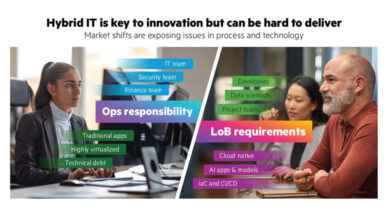Accelerating inclusive digital government

Ireland, globally recognised as a critical technology hub, faces a pivotal moment in its digital government journey. Ambitious targets are set for the next three years, as well as 90 per cent of core public services online by 2030, universal gigabit connectivity by 2030, and 80 per cent of adults with basic digital skills, writes Ali Bovis, Digital Adviser Public Sector at Version 1.
core public services online by 2030, universal gigabit connectivity by 2030, and 80 per cent of adults with basic digital skills, writes Ali Bovis, Digital Adviser Public Sector at Version 1.
The challenge for technology leaders in the Irish public sector will be translating this bold vision into tangible, beneficial results for every citizen.
To facilitate the momentum towards these horizon points, we have identified five practical priorities to consider as Ireland works to realise its digital ambitions:
1. Put the citizen at the centre from day one:
Digital government succeeds only when it reflects the real needs of citizens across all demographics and circumstances.
- Co-design services with users: Involve people representing diverse needs; elderly citizens, those with disabilities, non-native speakers, and digitally excluded communities throughout the entire process.
- Champion inclusion: Ensure accessibility compliance goes beyond meeting minimum standards. Services should use simple language, intuitive interfaces, and offer multiple access channels including phone, in-person, and digital options. The goal is not just digital-first, but digital-inclusive.
2. Close the digital skills divide:
Infrastructure investment alone will not deliver digital inclusion unless Ireland addresses the need for digital skills. While Ireland is a leader in basic digital skills at the European level, around one in four Irish adults still lack basic digital skills.
- Scale digital skills initiatives: Government must embed digital literacy into all education levels and creating targeted upskilling programmes for public sector workers. Nordic countries demonstrate the effectiveness of comprehensive digital skills programmes, countries like Sweden achieving 67 per cent basic digital skills coverage compared to the 54 per cent EU average.
- Support assisted digital: Invest strategically in community-based digital champions and face-to-face support services. Libraries, community centres, and local councils should become hubs for digital assistance, helping citizens navigate new online services while building confidence and capability.
- Measure and adapt: Use data analytics to identify which demographics are not engaging with digital services, then design targeted interventions. Regular skills assessments and user feedback loops ensure programmes remain relevant.
3. Embed cybersecurity and trust by default:
As Ireland’s digital footprint expands, so does its exposure to cyber threats. Recent attacks on global healthcare systems and critical infrastructure underscore the urgency of building resilience from the ground up.
- Make ‘secure by design’ the norm: All new digital systems must integrate security controls from conception, not as an afterthought. Including automated threat detection, zero-trust architecture, and regular penetration testing.
- Strengthen supply chain security: As public sector supply chains become increasingly digital, risks and vulnerabilities multiply. Implement rigorous vendor assessments, regular audits, and clear incident response protocols.
- Foster a culture of vigilance: Technology alone cannot realise digital government. Consistent training, awareness, simulations, and clear escalation procedures ensure every employee understands their role in maintaining security.
4. Harness data and AI responsibly:
Ireland’s next leap in service quality and efficiency depends on trusted, ethical use of data and emerging technologies like artificial intelligence.
- Build robust data governance: Enable secure, transparent data sharing between agencies while maintaining strict privacy protections. Establish clear data ownership, consent mechanisms, and audit trails. Estonia’s X-Road platform demonstrates how secure data exchange can dramatically improve service delivery while maintaining citizen trust.
- Trial AI where it adds value: Begin with targeted use cases that deliver measurable benefits for example, fraud detection, resource allocation, predictive maintenance, or automated customer service. Always maintain human oversight and ensure algorithmic transparency.
- Drive ‘data for good’ initiatives: Use integrated analytics to address complex social challenges like healthcare planning, climate adaptation, or social services coordination. Open data initiatives can also stimulate innovation in the private sector while improving government transparency.
5. Modernise collaboratively across teams and sectors:
Legacy systems and organisational silos remain the biggest barriers to digital transformation. Government leaders must drive agile, joined-up change that breaks down boundaries.
- Standardise and interoperate: Prioritise modular platforms, open APIs, and cloud-first architectures to accelerate service delivery and support future innovation – such as AI to facilitate modernisation.
- Adopt agile delivery methods: Move away from large, monolithic IT projects toward iterative, user-focused development. Regular releases, continuous feedback, and rapid prototyping reduce risk while delivering value faster.
- Reward collaboration: Actively promote partnerships between departments, local authorities, academic institutions, and private sector innovators. Complex digital challenges require diverse expertise, perspectives and incentives.
- Invest in digital leadership: Ensure senior leaders have the digital literacy and strategic vision needed to deliver transformation. This includes recruiting digital natives into leadership roles and providing comprehensive digital training for existing executives.
From ambition to impact
Ireland’s digital government ambitions are achievable, but success requires focused action across these five priority areas.
We will be embracing these priorities as part of our long-term engagement with the Department of Education, integrating HCM and Payroll Software as a Service (SaaS) solutions that will enable the timely, secure, and accurate processing of payroll.
Our team will lead on the design, development, integration, and management of the technology systems that service approximately 155,000 teaching and non-teaching staff, as well as retirees across Ireland.
By putting citizens first, closing skills gaps, securing trust, leveraging data responsibly, and modernising collaboratively, Irish public sector leaders can deliver transformation that truly serves everyone.
Time will determine whether Ireland emerges as a global leader in inclusive digital government or struggles with the mounting challenges of an increasingly digital world. The choice and the opportunity is clear.






